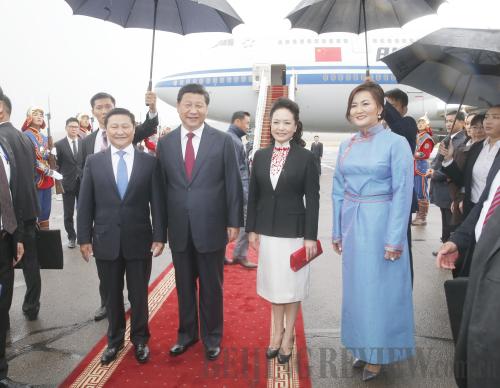|
 |
|
RED CARPET: Chinese President Xi Jinping (second left) and his wife Peng Liyuan (second right) are greeted by Mongolian Prime Minister Norov Altankhuyag (far left) and his wife in Ulan Bator on August 21 (XINHUA) |
The vast Mongolian grassland is a strikingly beautiful place in the summertime. Chinese President Xi Jinping chose to read from an ancient Chinese poem to express his impression of Mongolia when he paid a state visit to the country on August 21-22, quoting, "Blue sky, boundless wild; wind blows grass low; cattle and sheep appear."
It was Xi's second visit to Mongolia. In 2008, Xi paid a visit to Mongolia as vice president.
Both China and Mongolia have attached great importance to Xi's visit. The close friendship between the two countries was demonstrated as Mongolian President Tsakhiagiin Elbegdorj received Xi by hosting a dinner party at his residence. The press likened Xi's visit to a gathering with relatives.
During Xi's visit, China and Mongolia vowed to further advance their bilateral strategic partnership in five aspects—namely, enhancing mutual trust, expanding security cooperation, boosting cooperation in cross-border transportation and infrastructure, further enriching multilateral cooperation, and promoting two-way trade and investment.
A good fit
Wang Xiaolong, Chinese Ambassador to Mongolia, told Xinhua News Agency that China and Mongolia are enjoying favorable conditions for enhancing bilateral ties and strengthening cooperation.
This year marks the 65th anniversary of the establishment of diplomatic relations between the two countries. China and Mongolia are faced with the same major task of developing their economies and improving people's livelihood. Both sides regard cooperation as a precious opportunity for growth and attach great importance to promoting bilateral relations in the current international environment, Wang said.
Economic cooperation is a major aspect of China-Mongolia ties. In the aftermath of the 2008 global financial crisis, Mongolia's economic recovery has been stagnant due to global market uncertainties and frustrations stemming from failed talks with Brazilian mining giant Rio Tinto Group. The growth rate of the Mongolian economy has dropped to the lowest level in four years. During the first half of this year, foreign investment in Mongolia has shrunk 70 percent year-on-year. Inflation in the country is increasingly serious as its currency depreciation reaches an unprecedented record. It is hard for Mongolia to tackle these economic challenges, as the country relies heavily on its mining industry and foreign investment.
Against this backdrop, "Government officials, entrepreneurs and average people in Mongolia expect that upgrading cooperation with China will help the country overcome its current economic difficulties and achieve long-term growth," Wang said.
China-Mongolia ties have in fact made remarkable headway in various fields in recent years. In the past decade, China has continuously been the largest trade partner and investor of Mongolia. According to China's Ministry of Commerce, in 2002, bilateral trade was only $324 million. Last year, the figure had reached $6 billion, accounting for over a half of Mongolia's foreign trade. Meanwhile, a total of 5,737 Chinese companies run business in Mongolia—mostly in the mining industry and infrastructure construction.
"The Chinese and Mongolian economies as well as trade are complementary. For example, Mongolia sells minerals and energy to us, and we export mechanical and electrical products, textiles and food to them," former Chinese Ambassador to Mongolia Huang Jiakui said.
Currently, close ties between the two countries are best reflected in the energy sector. Many large coal mines and copper mines are located along the China-Mongolian border. China is the largest buyer of Mongolian coal, Huang said.
According to Mongolia's Trade and Development Bank, the country's coal export to China will reach 50 million tons in 2016.
China and Mongolia also reached cooperative agreements on deep processing of coal. Coal gasification is a major aspect of this cooperation, as China invested $30 billion in a project aiming to offer alternative energy for both Mongolian and Chinese people.
With this project, Mongolia gains a stable source of long-term financial revenue, said Bu Yongguang, research fellow in International Politics at Zhejiang Provincial Communist Party School.
| 